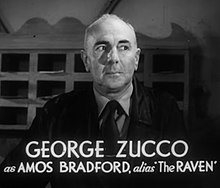|
George Zucco
George Zucco (11 January 1886 – 27 May 1960) was a British character actor who appeared in plays and 96 films, mostly American-made, during a career spanning over two decades, from the 1920s to 1951.[1] In his films, he often played a suave villain, a member of nobility, or a mad doctor.[2] Early life and familyGeorge Desylla Zucco was born in Manchester, Lancashire, on 11 January 1886.[1][3] His mother Marian (née Rintoul) ran a dressmaking business. His father, George De Sylla Zucco, was a Greek merchant from Corfu who became a naturalised British subject in 1865.[4][2][5] Zucco debuted on the Canadian stage in 1908 in a stock theater company.[6] He returned to the UK and served as a lieutenant in the British Army's West Yorkshire Regiment during the First World War.[7] He lost the use of two fingers when he was shot in the right arm in France. When the war ended, he studied at the Royal Academy of Dramatic Art and later taught there.[6] He became a leading stage actor of the 1920s, and made his film debut as Eugène Godefroy Cavaignac in The Dreyfus Case (1931), a British film dramatising the Dreyfus Affair. CareerZucco returned to the United States in 1935 to play Benjamin Disraeli in Victoria Regina,[8] and appeared with Gary Cooper and George Raft in Souls at Sea (1937). He played Professor Moriarty in The Adventures of Sherlock Holmes (1939), opposite Basil Rathbone as Sherlock Holmes and Nigel Bruce as Dr. Watson. Zucco earned a reputation as a bespectacled, nefarious character in films such as After the Thin Man, Fast Company, Arrest Bulldog Drummond, Charlie Chan in Honolulu, The Cat and the Canary, and My Favorite Blonde. During the 1940s, he took every role he was offered, landing himself in B-films and Universal horror films, including The Mummy's Hand (1940), The Mummy's Tomb (1942), The Mad Monster (1942), The Mad Ghoul (1943), Dead Men Walk (1943), The Mummy's Ghost (1944), House of Frankenstein (1944), and Tarzan and the Mermaids (1948). He was reunited with Basil Rathbone in another Sherlock Holmes adventure, Sherlock Holmes in Washington, this time playing not Moriarty, but a Nazi spy. Last years and deathAfter playing a bit part in David and Bathsheba (1951), Zucco undertook a role in The Desert Fox, but suffered a stroke one day on the set, and never significantly recovered (he was replaced by Cedric Hardwicke). He suffered from stroke-induced dementia for the rest of his life, and he died on 27 May 1960 from pneumonia in a nursing facility in Hollywood, aged 74.[1] Personal lifeHe and his wife, Stella Francis, had a daughter, Frances (1931–1962), who died of throat cancer at age 30, and a grandson, George Zucco (né Canto). Stella Zucco died from natural causes on May 11, 1999, aged 99, in Woodland Hills, California.[9] Filmography
References
External linksWikimedia Commons has media related to George Zucco.
|
||||||||||||||||||
Portal di Ensiklopedia Dunia
